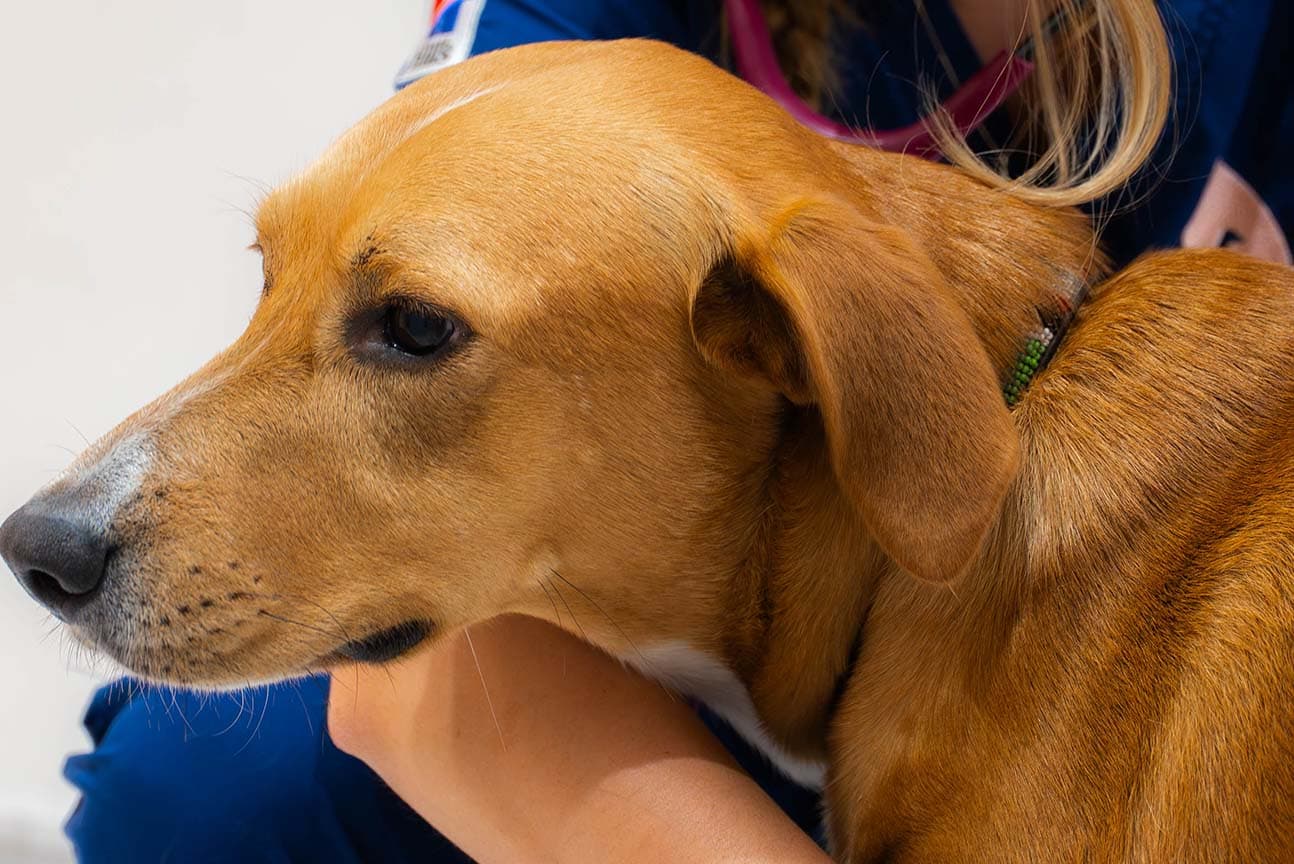Reviewed by Dr. Ionut Rusu
Updated on 10/09/2025
Reading time 4 min.
Overview
Severity: Low
Life stage: All
Fleas are more than just a nuisance; they can cause serious discomfort and health issues for dogs. In Dubai’s warm climate, fleas thrive year-round, making prevention and early detection essential. This article will guide you through spotting fleas early, understanding why our environment may increase risk, how to safely manage infestations, and steps to prevent them in the future.
What Are Fleas?
Fleas are tiny, wingless insects that feed on the blood of animals. They live on your dog’s skin and fur, but their eggs, larvae, and pupae hide in carpets, bedding, and furniture. Adult fleas can jump long distances and spread via contact with other animals, grass, clothing, or even your shoes. Once they find a host, they feed and reproduce rapidly, causing itching, skin irritation, and in severe cases, anaemia. What makes fleas particularly troublesome is their rapid reproduction cycle. A single female flea can lay up to 50 eggs per day, and these eggs can hatch within just two weeks under the right conditions. In Dubai, the constant heat accelerates their lifecycle, meaning infestations can escalate quickly if not addressed.
How to Spot the Signs of a Flea Infestation
Early detection is important for effective flea management. Here’s what to watch for:
- Excessive scratching, licking, or biting, particularly around the base of the tail.
- “Flea dirt” – small, dark specks in your dog’s coat that turn reddish-brown when moistened (this is actually flea droppings).
- Red, irritated skin or small bumps or scabs.
- Hair loss in areas where your dog has been scratching.
- Restlessness or inability to settle comfortably.
- General irritability or discomfort.
- In severe infestations: lethargy, pale gums or anaemia. More common in young puppies or older dogs.
The White Paper Test
A simple way to check for fleas is to comb your dog with a fine-toothed flea comb over a piece of white paper. Any fleas or flea droppings will be deposited on the surface, making them easier to spot against the white background. If the black specks turn red when wet, it’s flea dirt.
Risk Factors for Dogs in Dubai
Several factors increase your dog’s likelihood of picking up fleas:
- Playing in outdoor areas with vegetation like parks, gardens, and green spaces.
- Contact with other animals at dog parks, boarding, grooming facilities, communal areas or areas frequented by stray cats and dogs.
- Fleas thrive in shaded, fabric-rich areas like soft furnishings, carpets, beds, and even gardens.
- Fleas are harder to spot in dogs with thick or dark coats.
- In multi-pet households, fleas usually spread between pets before being noticed.
How Fleas Are Diagnosed
At home vs. at the clinic
Some flea problems are easy for owners to recognise, but milder cases can be tricky. A veterinarian can confirm whether it’s really fleas or another issue that looks similar. Common conditions that may be mistaken for fleas include:
- Irritation caused by sand mites
- Allergic skin flare-ups from dust or pollen
- Bacterial skin infections
- Other parasites such as lice or ticks
When to get your dog checked by a vet
Book a veterinary visit if you notice:
- Ongoing itching even after flea treatments
- Intense scratching, but no fleas in sight
- Patches of hair loss or sore skin
- Weakness or pale gums, which may signal anaemia
- More than one pet in the household is showing symptoms
Managing a Flea Infestation: A Two-Part Approach
Successfully treating fleas requires a dual approach: treating your dog and treating their environment.
- The most effective way to treat dog fleas is with a vet-approved product. Your vet can recommend the best option for your dog’s age, weight, and lifestyle:
- Oral medications can be tablets or chews. They are often very effective and can start killing fleas quickly.
- Spot-on treatments are liquids applied to your dog’s skin, usually between the shoulder blades, that distribute across their body. Avoid bathing or rain exposure for 48 hours after applying spot-ons.
- Flea collars can be highly effective and provide continuous, long-term protection.
- Fleas spread quickly between pets. Treat every pet in the household.
- During an infestation, 95% of fleas are in your home, not on your pet. Use household sprays that kill adult fleas and prevent egg development.
- Wash bedding at 60°C and vacuum regularly.
- If your dog is very itchy or has visible skin changes, speak to your vet about treatment. They may recommend soothing skin products, anti-itch medication, or other treatments.
Never use a flea product designed for a dog on a cat. Some ingredients can be toxic to felines. Always read the instructions carefully and ask your vet for guidance if you are unsure.
Can fleas from my dog affect my family?
While dog fleas prefer dogs, they can bite humans if their preferred host isn’t available. They won’t live on humans long-term, but their bites can cause itchy, red bumps. Treating your dog and home environment will resolve this issue.
Preventing Fleas: Your Year-Round Plan
Prevention is the best care you can give your dog and is far easier than treatment. Here’s how to stay ahead:
- Use regular flea preventatives year-round
- Groom your dog regularly to spot early signs
- Wash bedding and vacuum weekly
- Limit contact with stray or untreated animals
- Avoid high-risk areas outdoors (tall grass, communal pet zones), or check your dog immediately after visiting such areas.
Expert Care for Your Dog’s Flea Concerns
Worried about fleas affecting your beloved dog? Book a consultation or emergency appointment today at Modern Vet Hospital in Dubai. Our experienced veterinary team provides comprehensive diagnostic services, effective flea treatment options, and ongoing preventive care tailored to your dog’s specific needs. From routine flea prevention to treating active infestations, Modern Vet Hospital is your trusted veterinary partner in Dubai for thorough, compassionate care that keeps your furry family member comfortable and flea-free year-round.
Share this, choose your platform!
Reviewed by
Dr. Ionut Rusu
USAMV, RCVS
Dr. Ionut Rusu is a senior veterinarian with nearly a decade of successful experience in the field. He graduated in 2014 from the University of Agricultural Sciences and Veterinary Medicine (USAMV) in Cluj-Napoca, Romania.


